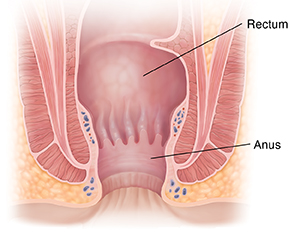The anus is the end of the large intestine below the rectum. It's where stool comes out of the body. Anal cancer starts in the cells that make up the inside lining of the inside of the anus.
Screening tests are done to check for diseases in people who don’t have symptoms. There are screening tests that can be used to check for anal cancer in people who may be at increased risk. It’s easier to treat anal cancer if it's found early, while it's small and before it has spread.
Tests to screen for anal cancer include:
-
Digital rectal exam (DRE). During a DRE, your healthcare provider puts a gloved, lubricated finger into your rectum. They feel for lumps or growths. This exam isn’t only used to check for anal cancer. It's also used to check for prostate cancer in men and rectal cancer in both men and women.
-
Anal cytology. If you are at high risk for anal cancer, your healthcare provider may recommend anal cytology, often called an anal Pap test. This is like the screening test women have for cervical cancer. A swab is used to remove some cells from your anus. The cells are checked under a microscope to look for cancer or signs of changes that could lead to cancer.
-
Anoscopy. This test allows the healthcare provider to look at the inside of the anus and rectum. A short, hollow tube with a light on it is put into the rectum. Through it, the provider can get a close look at the lining tissues. If changes are seen, a tiny piece of the changed tissue can be taken out and checked for cancer or other changes.
Who should be screened for anal cancer?
A healthcare provider may suggest screening for anal cancer in these cases:
-
Men who have sex with men
-
Women with a history of cervical, vaginal, or vulvar cancer
-
Anyone who is HIV-positive
-
Anyone who has a weakened immune system, such as people who are on immunosuppression medicines after organ transplant or those who are on steroids for a long time
-
Anyone with a history of anal warts
-
Women older than age 45 who are HPV 16 positive
If testing shows abnormal cells under a microscope, your healthcare provider will refer you for a biopsy. This is when a small piece of the changed tissue is removed and tested for cancer.
Not all experts agree that anal cancer screening is helpful. There's also no agreement on which tests should be used or how often screening should be done. There's also no research showing that screening can help find and treat cell changes early to reduce anal cancer risk. Still, you may want to talk to your healthcare provider about your anal cancer risk. Ask if regular screening might be right for you.


